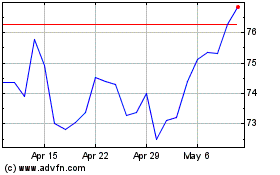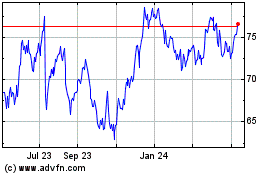Investment Banks Again Profit As Regional Banks Exit Bailout
March 18 2011 - 4:31PM
Dow Jones News
Regional banks KeyCorp (KEY) and SunTrust Banks Inc. (STI)
announced common stock and debt offerings Friday to repay
government bailout funds, and some of Wall Street's largest
investment banks stand to profit from underwriting the
transactions.
In SunTrust's $1 billion-stock offering, Goldman Sachs Group
Inc. (GS) and Morgan Stanley (MS), along with SunTrust's own
investment banking affiliate, could collect roughly $30 million in
fees from their work on the deal, according to data from Freeman
& Co., a financial services consultancy.
Freeman estimated KeyCorp's $625 million stock offering could
bring in about $19 million in fees, divided between Morgan Stanley,
J.P. Morgan Chase & Co. (JPM) and KeyCorp's investment banking
subsidiary, KeyBanc Capital Markets.
The projected data, based on the standard payment of 3% in
underwriting fees, underscores the investment banks' ability to
play a key role in the recovery of damaged rivals and, at the same
time, profit from their recapitalization.
SunTrust and KeyCorp disclosed their plans after the U.S.
Federal Reserve said it completed a second round of stress tests on
19 of the largest U.S. banks, several of whom announced plans to
boost dividends or buy back their shares. KeyCorp and SunTrust need
to pay back funds from the U.S. Treasury Department's Troubled
Asset Relief Program before they can pursue such measures.
Earlier Friday, Goldman Sachs said it will redeem preferred
shares held by Warren Buffett's Berkshire Hathaway (BRKA, BRKB),
including a one-time preferred dividend of $1.64 billion. J.P.
Morgan increased its dividend payout to a 25-cent quarterly payout,
up from 5 cents.
Morgan Stanley said it's comfortable with its capital position
and is focused on reinvesting in its businesses and purchasing the
rest of the Morgan Stanley Smith Barney brokerage joint
venture.
But for Morgan Stanley, its work on both deals is an opportunity
for the firm to build on its strong global equity underwriting
performance in 2010. Last year, the investment bank claimed the
coveted top ranking, thanks to its role in several
government-sponsored transactions such as the initial public
offering of General Motors Co. (GM) as well as large deals
including Bank of America Corp.'s (BAC) sale of a large chunk of
its stake in BlackRock Inc. (BLK).
Year-to-date, Morgan Stanley has a 6.1% global market share
within equity capital markets, good enough for a sixth place
ranking among financial institutions, according to data provider
Dealogic. The firm has served as an underwriter on 54 transactions,
including initial public offerings and secondary offerings, valued
at $10.7 billion. Within the U.S., the firm has a 7.8% market share
so far in 2011.
Financial-company issues have bolstered Morgan Stanley in the
past. In the second quarter of 2009, Morgan Stanley's former chief
financial officer, Colm Kelleher, said the firm was "a leader in
helping financial institutions recapitalize, including equity
capital raises for US Bancorp (USB), State Street Corp. (STT), and
SunTrust."
J.P. Morgan also benefited from underwriting a slew of capital
and debt raises by banks large and small as the financial services
industry recovered from heavy losses following the financial
crisis. The firm is now ranked seventh globally within equity
capital markets, just behind Morgan Stanley. J.P. Morgan has worked
on 64 deals valued at $9.7 billion, according to Dealogic.
But both firms have some work to do to catch Goldman Sachs. Wall
Street's most profitable investment bank is ranked first
year-to-date, serving as a bookrunner on 49 deals valued at $19.8
billion. It has an 11.3% market share globally and a 17.9% share in
the U.S.
Representatives for Morgan Stanley and Goldman Sachs declined to
comment for this story. J.P. Morgan didn't immediately respond to a
request for comment.
Shares of Goldman Sachs recently traded up 2.7% at $159.92.
Morgan Stanley was down three cents at $27.42, while J.P. Morgan
rose 2.3% to $45.59.
-By Brett Philbin, Dow Jones Newswires; 212-416-2173;
brett.philbin@dowjones.com
State Street (NYSE:STT)
Historical Stock Chart
From Jun 2024 to Jul 2024

State Street (NYSE:STT)
Historical Stock Chart
From Jul 2023 to Jul 2024
